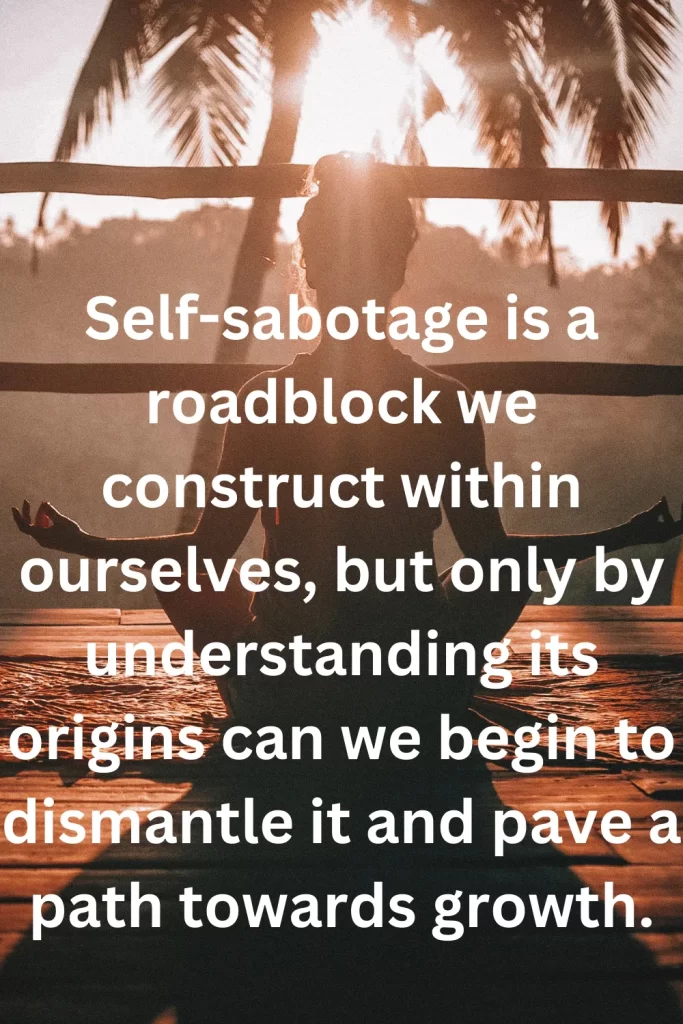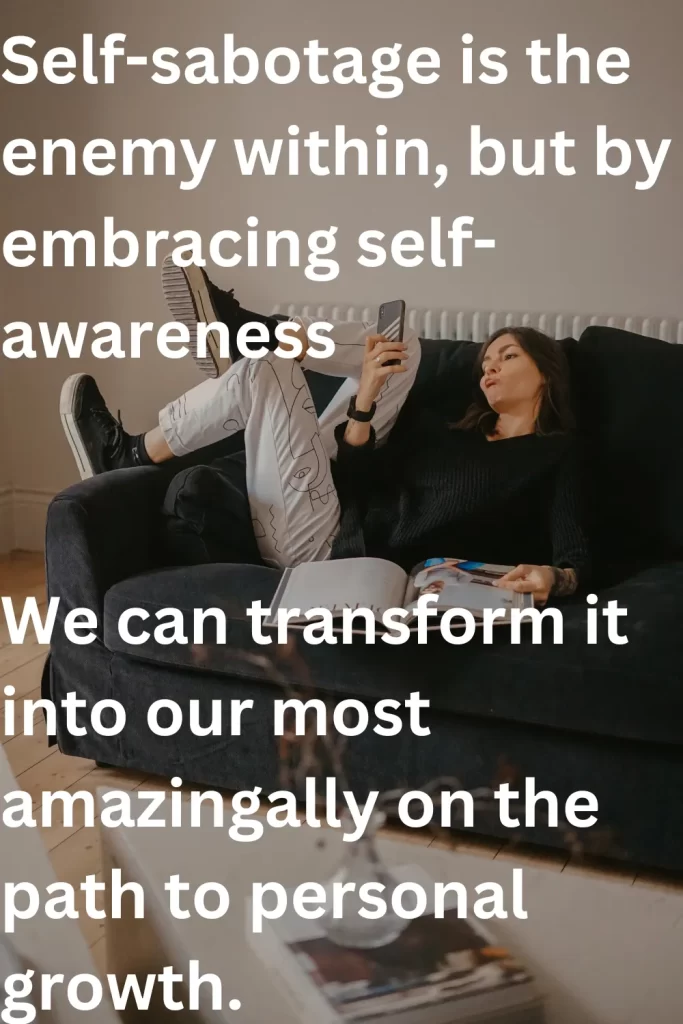Don’t let self-sabotage stand in your way. Take control of your life with these powerful questions and unleash your true potential.
Table of Contents
We all have goals, dreams, and ambitions that we want to accomplish in life. Yet, time and time again, we find ourselves getting in our own way, self-sabotaging our own progress.
Whether it’s procrastination, negative self-talk, or fear of failure holding us back, the cycle seems never-ending.
But what if there was a way to break free from this self-destructive pattern?
In this article, we will explore six powerful questions that have the potential to unlock the doors to self-awareness and help you put an end to self-sabotage once and for all.
Understanding Self-Sabotage and Its Impact
Self-sabotage is a sneaky and destructive habit that we often engage in without even realizing it.
It manifests in various ways, from procrastinating on important tasks to self-destructive behaviors that prevent us from achieving our goals. Understanding self-sabotage is crucial because it can have a significant impact on our lives.
When we engage in self-sabotaging behaviors, we are essentially hindering our progress and growth.
By sabotaging ourselves, we might miss out on opportunities for success or create obstacles that impede our path to happiness.
The impact of self-sabotage can be long-lasting and pervasive, affecting not only our personal lives but also our professional endeavors and relationships.
By digging deep and uncovering the underlying reasons behind our self-sabotaging tendencies, we can take steps to overcome them.
It requires honest introspection and a willingness to confront uncomfortable truths about ourselves.
However, by identifying the patterns of self-sabotage in our thoughts and actions, we can start making conscious choices that align with what truly serves us rather than what holds us back.
Breaking free from the clutches of self-sabotage is an empowering journey that allows us to reach new heights of personal fulfillment and success.

Quotes
“Self-sabotage is a roadblock we construct within ourselves, but only by understanding its origins can we begin to dismantle it and pave a path towards growth.”
“Acknowledging self-sabotage is not a sign of weakness; it’s the first step towards reclaiming our power and unleashing our potential.”
“By embracing self-compassion instead of self-sabotage, we can rewrite the narrative of our lives and create a space for personal transformation.”
“Self-sabotage may cast shadows on our journey, but with awareness and resilience, we can turn those shadows into stepping stones towards success.”
The First Step: Recognizing Your Patterns
We all have patterns – those recurring behaviors, thoughts, and habits that seem to define us.
Some patterns are positive and can propel us forward in life. But more often than not, we find ourselves stuck in negative patterns that hold us back from reaching our full potential.
Recognizing these patterns is the crucial first step towards breaking free from self-sabotage.
It involves taking a long, hard look at ourselves and our past choices, becoming aware of the beliefs and fears that drive our actions.
Sometimes these patterns are so ingrained that they become invisible to us, operating on autopilot in the background of our lives.
But by bringing them into conscious awareness, we gain the power to change them.
One way to start recognizing your own patterns is by asking yourself reflective questions: What situations trigger certain emotions?
How do you typically respond when faced with a challenge? Are there any recurring themes or narratives in your life?
By observing your behavior and thought processes without judgment or attachment, you can identify the repetitive patterns that may be sabotaging your progress.
Question 1: What is the underlying fear?
When it comes to self-sabotage, one question that often arises is: what is the underlying fear?
Why do we engage in behaviors that hinder our progress and prevent us from reaching our goals? It all boils down to fear, an emotion deeply rooted within us.
Fear can take many forms – fear of failure, fear of judgment, fear of success. It lurks in the shadows, whispering doubts into our minds and convincing us that we are not capable or worthy.
But here’s the thing: fear is a natural human response designed to protect us. It’s there to alert us to potential dangers and threats.
The problem arises when fear becomes excessive or misdirected, leading us down a path of self-sabotage.
Unearthing the underlying fear requires introspection and self-awareness. Perhaps it stems from past failures or traumas that have left a lasting impact on our psyche.
Maybe it’s rooted in deeply ingrained beliefs about ourselves and our abilities.
By identifying and understanding this core fear, we can start dismantling its power over us and ultimately break free from self-sabotaging behaviors.
Recognizing that the underlying fear exists is just the first step towards overcoming self-sabotage.
We must then challenge and reframe these fears with more empowering perspectives.
Recognize that failure is not fatal but an opportunity for growth; judgment from others does not define your worth; success is your birthright as much as anyone else’s.
Question 2: How does self-sabotage serve me?
Self-sabotage is a tricky concept that often leaves us wondering why we would intentionally sabotage our own success.
However, when we take a closer look, it becomes evident that self-sabotage serves a purpose in our lives.
It may sound counterintuitive, but indulging in self-sabotaging behaviors can actually provide comfort and help us stay within our familiar comfort zones.
One way in which self-sabotaging behaviors serve us is by protecting us from the fear of failure or rejection.
By engaging in actions that hinder our progress or success, we create an excuse for not pursuing our goals wholeheartedly.
This allows us to avoid potential disappointment or judgment from others and maintain a sense of control over our lives.
Additionally, self-sabotage might serve as a defense mechanism against change and uncertainty.
Stepping into the unknown can be daunting, triggering feelings of discomfort and anxiety.
By sabotaging ourselves, we inadvertently keep ourselves stuck in the same patterns and routines that feel safe and familiar.
Understanding how self-sabotage serves us is the first step towards breaking free from its grip.
Once we acknowledge the underlying reasons behind these behaviors, we can start exploring healthier strategies to navigate fear and embrace growth.

Quotes
“Self-sabotage may seem counterproductive, but it serves as a wake-up call to reassess our true desires and align our actions accordingly.”
“In the realm of self-sabotage lies an opportunity for growth, as it teaches us to confront our fears and break free from self-imposed limitations.”
“Although self-sabotage can hinder progress, it also highlights the importance of self-reflection and the need to prioritize our well-being over external expectations.”
“Embracing self-sabotage as a temporary setback allows us to learn valuable lessons and emerge stronger in our pursuit of personal success.”
Question 3: What are my limiting beliefs?
When it comes to self-sabotage, one of the most important questions you can ask yourself is: What are my limiting beliefs?
Limiting beliefs are negative thoughts or beliefs that hold us back from reaching our full potential.
They are often deeply ingrained and can be hard to identify, but they play a significant role in self-sabotaging behaviors.
Common limiting beliefs include thoughts like I’m not smart/good enough, I don’t deserve success/happiness, or I will never be able to achieve my goals.
These beliefs create a negative mindset and become barriers to progress. By identifying and challenging these limiting beliefs, you can break free from self-sabotage and start nurturing a positive mindset that empowers you to succeed.
It’s crucial to recognize that limiting beliefs are not facts; they are simply stories we tell ourselves. By questioning their validity and searching for evidence to counter them, we can begin dismantling their power over us.
This process requires self-awareness and reflection, as well as an understanding of where these beliefs originated from.
Often, they stem from childhood experiences or societal conditioning. By acknowledging our past influences and consciously choosing new empowering beliefs, we take control of our own narrative and pave the way for personal growth without the self-inflicted hurdles.
Question 4: Am I seeking validation from others?
We all crave validation from others to some extent. It’s human nature to want recognition and approval for our achievements, ideas, and even our appearance.
Seeking validation is not inherently negative; it can motivate us to set goals and strive for excellence.
However, when the need for validation becomes excessive, it can lead to self-sabotage.
Constantly seeking external approval puts our sense of self-worth in the hands of others, leaving us vulnerable to disappointment and feelings of inadequacy.
Recognizing whether you are seeking validation from others is crucial in breaking free from self-sabotaging patterns.
Take a moment to reflect on your actions and motives. Are you constantly seeking praise and reassurance?
Do you often feel disappointed or inadequate if others don’t recognize your efforts?
Remember that true fulfillment comes from within – by developing a strong sense of self-worth based on your values, passions, and personal growth rather than relying on the opinions of others.
Seeking validation from others can also hinder our ability to take risks and pursue our dreams authentically.
When we consistently seek outside approval, we may subconsciously modify our behavior or suppress certain aspects of ourselves that could be seen as unconventional or different.
Ultimately, this compromises our ability to be true to ourselves and fully embrace who we are meant to be.
Quotes
“Seeking validation from others only leads to temporary happiness, true contentment comes from within.”
“When you stop seeking validation from others, you open yourself up to discovering your own unique worth and potential.
Validation should be sought from within, for the opinions of others are merely reflections of their own insecurities.”
“The strongest validation one can receive is self-acceptance and self-love, for that is where true fulfillment lies.”
Question 5: How can I shift my perspective?
Shifting our perspective is a powerful tool that can help us break free from self-sabotaging patterns and create positive change in our lives.
When we find ourselves stuck in negative thinking or destructive behaviors, it’s important to remember that our perspective is not fixed; it can be molded and reshaped.
One way to begin shifting our perspective is by practicing gratitude. Taking time each day to acknowledge the things we are grateful for can help us see the positive aspects of our lives and shift our focus away from negativity.
Another effective method for shifting perspective is through reframing. Reframing involves consciously choosing to see a situation in a different light, finding alternative explanations or interpretations.
For example, instead of viewing a setback as a failure, we can reframe it as an opportunity for growth and learning.
This shift in perception allows us to approach challenges with resilience and optimism.
Ultimately, shifting your perspective requires conscious effort and practice. It may take time to break free from old thought patterns and beliefs, but with persistence and self-awareness, you have the power to transform your outlook on life.
Remember, you have the ability to choose how you perceive yourself, others, and the world around you – embrace this power, challenge limiting beliefs, and watch as new possibilities unfold before your eyes!
Question 6: What small actions can I take?
Taking small actions may seem insignificant, but they can have a profound impact on stopping self-sabotage.
One important action is to practice self-awareness. By paying attention to your thoughts and behaviors, you can identify patterns of self-sabotage and interrupt them before they escalate.
This might involve journaling, meditation, or seeking therapy to gain deeper insights into your underlying motivations.
Another powerful small action is to set realistic goals. Often, self-sabotage arises when our expectations are too high or unrealistic.
By breaking down larger goals into smaller, manageable steps, we increase our chances of success and reduce the likelihood of self-sabotaging behaviors that stem from feelings of overwhelm or doubt.
Lastly, engaging in regular acts of self-care is crucial for combating self-sabotage. When we neglect our physical and emotional needs, we leave ourselves more vulnerable to destructive habits and negative thought patterns.
Prioritizing activities such as exercise, healthy eating, getting enough sleep, and nurturing supportive relationships can greatly reduce the likelihood of sabotaging ourselves.
Ultimately, it’s important to remember that stopping self-sabotage is not an overnight process.
It requires consistent effort and patience with yourself. But by taking small actions like practicing self-awareness, setting realistic goals, and prioritizing self-care on a daily basis – you’ll gradually break free from the cycle of sabotage and create a more empowered and fulfilling life for yourself.
Conclusion: Embrace self-awareness and break free from self-sabotage.
It’s time to bid farewell to self-sabotage and welcome a life of self-awareness and growth.
We have explored six powerful questions that can help you identify and overcome your self-sabotaging behaviors.
By embracing self-awareness, you become more conscious of the thoughts, beliefs, and actions that are holding you back.
Self-sabotage often stems from fear, limiting beliefs, or past conditioning. But by asking ourselves these thought-provoking questions, we gain clarity on our patterns and habits that hinder our progress.
Becoming aware of our triggers allows us to take control of our responses and make intentional choices instead of falling into old destructive patterns.
By breaking free from self-sabotage through self-awareness, we open up new possibilities for ourselves.
We can step into our power and create a life that aligns with our true desires and purpose. It may require consistent effort and practice, but the reward is worth it – a life lived authentically with endless potential for growth and fulfillment.
So let go of self-sabotage, embrace self-awareness, and embark on your journey towards personal empowerment.

Quotes
“Embrace self-awareness and release the chains of self-sabotage; only then can you truly soar and reach your full potential.”
“The journey towards self-awareness is not always easy, but the rewards of breaking free from self-sabotage are worth every step.”
“In a world filled with distractions and external expectations, self-awareness becomes the compass that guides us away from self-sabotage and towards our true desires.”
“Self-sabotage is the enemy within, but by embracing self-awareness, we can transform it into our greatest ally on the path to personal growth.”
FAQs
1. What is self-sabotage?
Self-sabotage refers to the unconscious or deliberate actions and behaviors that hinder our own progress, success, or well-being.
2. How can I identify if I am self-sabotaging?
You may be self-sabotaging if you notice patterns of procrastination, fear of failure, negative self-talk, excessive perfectionism, avoiding opportunities for growth, or repeating destructive behaviors.
3. Why do people engage in self-sabotage?
Self-sabotage often stems from underlying fears, low self-esteem, past traumas, or limiting beliefs that prevent individuals from fully embracing their potential and pursuing their goals.
4. What are some common signs of self-sabotage in relationships?
Signs of relationship self-sabotage include pushing loved ones away, sabotaging intimacy or trust, creating unnecessary conflicts, engaging in controlling behaviors, or avoiding vulnerability.
5. Can self-sabotage be overcome?
Yes! With awareness and a willingness to change, it is possible to overcome self-sabotaging patterns through therapy, personal development work, setting realistic goals, improving self-care practices, and challenging negative thought patterns.
6. How can I stop myself from sabotaging my own success?
Start by identifying the triggers that lead to your self-sabotaging behavior. Develop strategies such as positive affirmations, visualization techniques, seeking support from others, setting achievable goals with accountability systems in place and practicing mindfulness to interrupt those patterns.
7. Is it normal to feel guilty after realizing my own acts of self-sabotage?
Feeling guilt is a common response when becoming aware of one’s own acts of sabotage. It’s important to acknowledge these feelings but also remember that everyone makes mistakes. Use this realization as an opportunity for growth and commit to making positive changes going forward.
8. When should I seek professional help for overcoming self-sabotage?
If self-sabotaging behaviors are significantly impacting your life, relationships, or mental health, seeking professional help from a therapist, counselor, or coach is recommended. They can provide guidance and support tailored to your specific needs.
Quotes
“Don’t be your own worst enemy; unleash the power within you and become your greatest ally.”
“Self-sabotage is like watering weeds instead of nurturing flowers; redirect your energy towards growth and watch yourself bloom.”
“Embrace the uncomfortable, for it is in facing our fears that we dismantle the self-sabotaging patterns holding us back.”
“You hold the key to unlocking your full potential; stop sabotaging yourself and start living up to your true greatness.”










